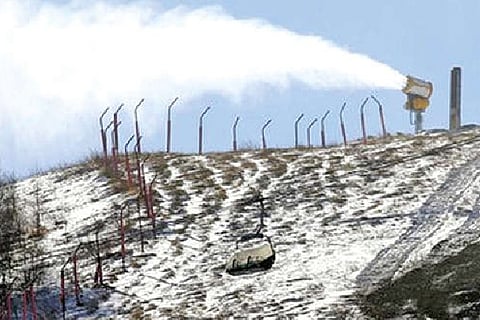

Chennai
The downhill skiing and snowboarding portions of the Winter Olympic Games begin on February 4 at mountains near Beijing that traditionally have very little snow — a problem that also beset the 2014 games in subtropical Sochi in Russia. The usually barren mountainsides in Yanqing and Zhangjiakou where the skiing events are held will rely for the first time on 100% artificial snow. The cannons that are used to produce the snow are not only energy-intensive, but are fed with water from over 30 km away, said Carmen De Jong, a professor of hydrology at the University of Strasbourg who has researched environmental impacts of the Beijing games.
But snowmaking isn’t the only reason De Jong calls this year’s Winter Olympics “the most unsustainable games of all time.” She, too, describes the heavy erosion caused by tree-felling to create ski runs in nature reserves, despite a large tree replanting effort and the fact that villages and infrastructure such as roads and parking lots were mostly “constructed from scratch” using near 10 million tonnes of CO2, a “conservative estimate,” she says.
The Beijing Organizing Committee (BOC) promised a-low-carbon event run, when possible, on renewable energy. But while wind turbines and solar farms have been built at the sites, De Jong says there is a strong reliance on carbon offsets to square the emissions ledger. The “energy-intensive” pumping of water uphill to make snow in the arid region has not been included in the climate neutrality calculations, she said.
Ultimately, the “problem is that the climate in Beijing is not appropriate for snow-making,” De Jong said. The high winds that blow up dust in the dry region, and which settles on the snow, means that double the artificial snow is required than would be produced in European Alps.
“So the snow guns are running for longer than usual [and] they have to use a lot more water that is used on average in the Alps,” De Jong said. This problem is being exacerbated as the games move to dry, water- and snow-scarce Asian locations, with most potential European or North American venues no longer bidding for the games because of cost and environmental impacts. Beijing’s reliance on artificial snow is not new, with the 2014 Sochi and 2018 Pyeongchang games needing 80% and 90% of machine-made snow cover respectively. Meanwhile, at the 2010 Vancouver winter Olympics, helicopters were also used to ship in snow from high altitudes as it was too warm to make fake snow.
Even if the snowmaking machines are to be run on renewable energy, a new study shows that failure to dramatically reduce global greenhouse gas emissions may mean that only one of the 21 previous Winter Olympics host cities can provide “fair and safe conditions” for the games by 2100.
By contrast, if the Paris Climate Agreement emission targets are met, the number of climate-reliable host cities rises to eight. The study uniquely combines climate modeling with responses from athletes on the safety of skiing in a warmer environment. Even within 30 years, current heating trends mean the number of viable Winter Olympics locations will quickly diminish.
“If we go down the high emission pathway, by mid-century we are left with four that are climate-reliable,” said Daniel Scott, a professor of geography and environmental management at the University of Waterloo and lead author of the study. Sapporo, Japan, would be the only viable location by century’s end.
“Sochi made no sense climatologically,” Scott said of the 2014 games that were already not climate reliable. But global heating will make many once-reliable venues untenable. Many ski athletes “have real concern about the future of their sport,” he said. “Making Olympic venues more climate-friendly won’t alone fix the problem.”
This article was provided by Deutsche Welle
Visit news.dtnext.in to explore our interactive epaper!
Download the DT Next app for more exciting features!
Click here for iOS
Click here for Android